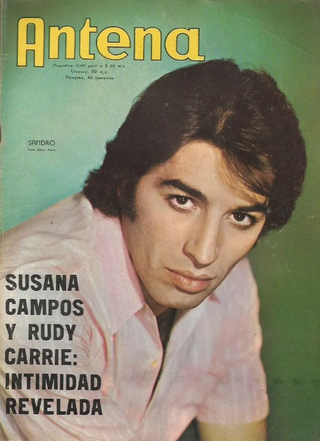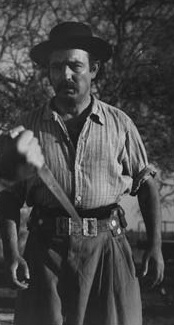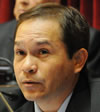
Civic Coalition ARI, until October 2009 known as Support for an Egalitarian Republic, is a centrist political party in Argentina founded in 2002 by Elisa Carrió.

Elections in Uruguay encompass three different types: general elections, departamental elections and municipal elections. At the national level, Uruguay elects a head of state and a legislature. Voting is compulsory and extends to all citizens aged 18 and over.
The Fueguian People's Movement is a provincial political party in the Tierra del Fuego Province of Argentina. It was formed in 1985, becoming the first provincial political party in Tierra del Fuego, and was, for most of its history, one of the main political parties in the province.
Caló is a language spoken by the Spanish and Portuguese Romani ethnic groups. It is a mixed language based on Romance grammar, with an adstratum of Romani lexical items, through language shift by the Romani community. It is said to be used as an argot, or a secret language, for discreet communication amongst Iberian Romani. Catalan, Galician, Portuguese, and Spanish caló are closely related varieties that share a common root.

Mario Soffici was an Argentine film director, actor and screenwriter of the classic era.

Roberto Sánchez-Ocampo, better known by his stage names Sandro or Sandro de América, was an Argentine singer and actor. He is considered a pioneer of Argentine rock for being one of the first rock artists to sing in Spanish in Latin America. He edited 52 official records and sold eight million copies although other sources state that he sold over 10 million. Some of his most successful songs are "Dame fuego", "Rosa, Rosa", "Quiero llenarme de ti", "Penumbras", "Porque yo te amo", "Así", "Mi amigo el Puma", "Tengo", "Trigal", and "Una muchacha y una guitarra". The single "Rosa, Rosa" sold two million copies, being his most recognizable and famous song. Another of his hits, "Tengo" was given 15th place among the 100 best Argentine rock songs by both MTV and Rolling Stone magazine. In Latin America he was often compared to Elvis Presley at the height of his popularity.

Soledad Silveyra, is a prominent TV, theater and cinema Argentine actress.

Tristán Bauer is an Argentine film maker, screenwriter and politician. From 2019 to 2023, he served as Argentina's Minister of Culture in the cabinet of President Alberto Fernández.

The Argentina Bicentennial was a series of ceremonies, festivals, and observances celebrated on May 25, 2010, and throughout the year. They commemorated the 200th anniversary of the May Revolution, a sequence of historical events that led to the Viceroy Baltasar Hidalgo de Cisneros being ousted from office and replaced with the Primera Junta, the first national government.

Mirgor is an Argentinean company that produces electronics, mobile and automotive components, and exports, distributes and commercializes agricultural products. It has its administrative headquarters in the city of Buenos Aires, and industrial sites in Río Grande, Garín and Baradero, as well as its own agricultural-livestock exploitation field in Bolívar.

The K money trail was a 2013 journalistic investigation into political corruption in Argentina. It began with reports on the Periodismo para todos television program hosted by journalist Jorge Lanata. The investigation was named "the K money trail" to imply that former presidents Néstor Kirchner and Cristina Fernández de Kirchner were involved. The investigation showed embezzlement had taken place and suggested the money trail involved Néstor Kirchner, Cristina Fernández de Kirchner and an alleged partner, businessman Lázaro Báez. The journalists concluded that Báez diverted money intended for public infrastructure to tax havens. The television show led to an official investigation. In April 2016, Lázaro Baez was arrested for corruption charges and jailed in the Ezeiza Federal Prison Complex awaiting trial. In mid-2020 he was transferred to house arrest as the proceedings were put on hold due to the COVID-19 pandemic. In 2021, Báez was sentenced to 12 years in prison for money laundering. In June 2023, a separate case looking into possible wrongdoing by Cristina Kirchner was dismissed after the prosecution failed to produce evidence.
The following lists events that happened in Argentina in 2018.

Raúl del Valle was a Chilean film and theatre actor who performed for most of his career in Argentina.
The FORJA Concertation Party is a political party in Argentina. It was founded in 2008 as a split from the Radical Civic Union. The party now forms part of the Unión por la Patria, the former ruling coalition which supported then- President Alberto Fernández, formed in 2023 to support Sergio Massa's presidential candidacy. At the time of its foundation and until the alliance's dissolution, the party was a member of the Front for Victory.
María Teresa Rivas was a Mexican actress. Along with Silvia Derbez, she is considered one of the pioneers of telenovelas in Mexico, appearing in more than 50 in her career, beginning with an iconic villain role in Gutierritos (1958).
Claudia Josefa Palacios González (?–1881) was an Uruguayan painter and miniaturist of the nineteenth century. She is best known for creating the first visual representation of Uruguayan independence episode known as Desembarco de los Treinta y Tres Orientales.

Osvaldo Ramón López is an Argentine lawyer and politician, who was a National Senator for Tierra del Fuego from 2011 to 2013. He took office in the Senate in replacement of José Carlos Martínez following Martínez's death in 2011. Upon being sworn in, López became the first openly gay member of the Argentine Congress.










